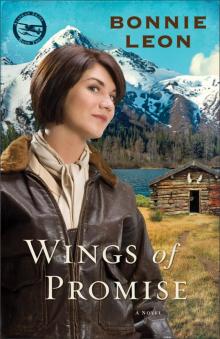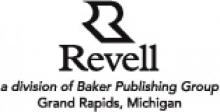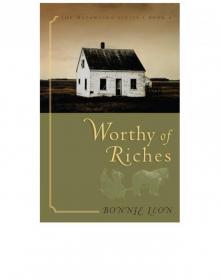- Home
- Bonnie Leon
Worthy of Riches Page 12
Worthy of Riches Read online
Page 12
“How wonderful! I knew they'd like it!” Laurel hugged Adam.
“There's more. They want me to do a whole series of stories on Alaska—one every week!”
“I'm so proud of you!” She kissed him. “You can work right from home. You won't have to move!”
“Move? Who's moving? What are you talking about?”
“I just thought you missed writing so badly that maybe we ought to move back to Chicago.”
“I don't want to live there. I love it here. This is where we belong.”
“When I watched you writing, you looked so happy. I figured you should write even if it meant not living here.”
Adam grinned. “I'm going to write, but I'm not moving!” He scanned the letter again. “We'll be fine, just fine.” He paused. “I'll have to interview a lot of the old sourdoughs around her to get more stories, but I figure I'll have time to do that and to work the farm.”
“I know a lot about Alaska. With all the work I've been doing on Jessie's notes, I've learned a lot. You'll have lots of material for stories. And I'd love to do some of the research for you.”
“That would be perfect.” Adam threw an arm around Laurel's shoulders. “We'll be a team. You can be the researcher, and I'll be the writer!” Suddenly, he lifted Laurel and twirled her around.
Laurel laughed. “Adam, put me down. I'm getting dizzy.” Once steady on her feet, she looked into her husband's eyes. Now I can tell him, she thought, excitement building. Keeping her hands on his muscled arms, she smiled. “I'm glad you'll be able to write, especially now.”
“What do you mean, especially now?”
“Oh, Adam, everything is perfect. Our life is perfect.” Laurel kissed him. “I have some news.”
“What?”
“I wasn't completely honest with you about what the doctor said.”
“What do you mean? Is everything all right?”
Laurel laughed. “Yes. Everything's fine.” She smiled coyly. “In fact, it's perfect. We're going to have a baby.”
Adam looked dumbstruck for a moment. When he found his voice, he asked, “A baby? You're sure?”
Laurel nodded.
“When?”
“December.” Adam wasn't reacting the way Laurel had expected. Instead of being elated, he looked worried. “I thought you'd be happy.”
Adam smiled, and his face lit up. “I am. I just can't believe it. I'm going to be a father!” He pulled Laurel into his arms, kissed her, and held her against him. “A father.” Adam held Laurel away from him and placed his hand on her abdomen. “A baby's growing inside you.” A question touched his face. “Why didn't you tell me? You saw the doctor a couple of weeks ago.”
Laurel took a breath. “I was waiting for you to hear back from the paper. I knew you wouldn't move if you found out I was pregnant.”
“I never said I wanted to move.”
“I know. I just thought that maybe we should. I know how much you've missed writing.”
Adam smiled. “I wouldn't have gone. Remember how hard you hung on, insisting we belonged here? Well, it took me a while to see it, but you were right.” His eyes moved over farmland, wild fields, forests, and mountains, then settled on their house. “I love it here. I want to raise my children here.” He hugged Laurel again. “Let's tell your mother.”
“No. Not yet.”
“Why?”
“What if something happens?” She glanced at her stomach. “I don't think anything will, but it hasn't been very long since Daddy died, and if something did go wrong, well, it would be so hard on her.”
“All right, but it's not going to be easy to keep this secret.”
“It'll just be for a little while.”
Adam smiled. “All right. I'll wait, but not too long, OK?”
“OK.” Laurel stepped into her husband's embrace and rested her cheek against his cotton shirt. “I'm so happy. I just wish Daddy were here. He would have been such a good grandfather.”
“We'll tell him all about his grandfather.”
“It might be a girl.”
“Maybe.” He kissed the tip of Laurel's nose. “Course I wouldn't mind. If we have a little girl, she'll look just like you, and I'll be in love all over again.”
Chapter 12
JEAN PLACED THREAD AND NEEDLE IN HER SEWING BASKET AND LEANED BACK in her chair. She was weary but dreaded going to bed. The nights were long and empty. At the end of each day they loomed, and Jean would put off the inevitable. She sewed, baked, or tidied the house, anything to put off going to bed.
With a sigh she finally set the sewing aside, stoked the fire, then turned down the front room lantern. Arms wrapped around her waist, she stood at the window and stared out. It was nearly eleven o'clock, but a soft glow still touched the sky above the mountains, and dusk hung over the valley. Maybe it would be easier to sleep if it were dark, Jean thought. It would only seem more bleak.
“No reason to stay up,” she said and walked to her room. Pulling back the bed covers, she sat on the soft mattress. Moving as if in slow motion, she kicked off her slippers and slid between cool sheets. Pulling the blankets up under her chin, Jean stared at the ceiling, following the progress of a small spider lithely making its way toward a distant corner. She closed her eyes and listened to the house. It was quiet except for an occasional settling creak.
The familiar aching crept over her. Why couldn't she drive it back? Pain embedded itself in her chest, and the tears came once again. She knew God was near, but she felt alone. Please Father, help me.
Jean ran her hand over the place where Will used to lie beside her. Most nights they had snuggled together and visited quietly, talking about the children, their hopes, and their fears. Then, clasping hands, they had prayed. For twenty-three years Jean had fallen asleep with Will's arm protectively draped over her.
Now she was only half of a whole. She had no warm body beside her, no soft snoring, no gentle touch. “I miss you,” she whispered, cradling Will's pillow and breathing in his scent. Already it was fading. “I'm scared. How can I live without you?”
Anger settled in, momentarily overriding the grief. “You didn't have to die. Why did you do it? You should have thought of us.” Confused and ashamed, Jean buried her face in the pillow and sobbed.
She cried until she had no tears left, then stared into a brief darkness, willing sleep to come. Lord, I don't think I can do this. I can't bear it. I feel as if it will kill me. I want to die. At least I will be free of this agony.
Even as the thoughts came, Jean rejected them. She had to live. Her family needed her. And the pain would ease, she'd been told. “Lord, forgive me for my selfishness. Forgive me for my weak faith. Help me to be strong.”
Jean's mind wandered to more practical problems. How would she keep the farm? Luke was strong and determined, but he was only seventeen. And he couldn't live at home indefinitely. He had his own life. Before Will died, Luke had expressed a desire to move on, and he'd made it clear he didn't love farming the way his father had. Jean couldn't work the farm by herself. What should she do?
“Father, show me what to do, and give me the courage and strength to do it.” Wind howled under the eves, and she felt more anxious. “Give me wisdom.” She snuggled into Will's pillow again and wondered what he would have done. He wouldn't have panicked. He'd be calm and practical and sort out the choices. She closed her eyes. “All right, I'll wait on you, Lord.”
The following morning at breakfast, Luke dragged into the kitchen and plopped down at the table.
“What's wrong?” Brian asked, scooping a forkful of eggs into his mouth.
“What do you care?” Luke asked crossly.
Jean set a plate of eggs and toast on the table in front of him. “Don't be mean. Your brother just cares about you.”
“Sorry. I'm tired.” Luke took a bite of toast.
Jean returned to the stove. “Eat those eggs. It's the one thing we've got plenty of. The hens have been laying up a storm. Some are giving us
two a day.”
“It's the long days. Alex told me their chickens are doing the same thing.” Luke shrugged. “Suits me. I like eggs.” Picking up his fork, he rested a hand on the edge of his plate. “Sorry for bein' so crabby. You sure don't need me grumping around here making life harder on you.”
“You're entitled, but it won't make you feel better.”
“Yeah, I know.” He yawned and stretched. “I could use a few more hours sleep though.”
“We've got work to do,” Brian said. “And you told me I could help.”
“Yeah. I'll be weeding. You're pretty good at that. Right?” He grinned.
“Weeding? That's what we're doing?” Brian shoved the last of his toast in his mouth.
“Yep. Can't let the weeds take over.”
Susie climbed down from her chair and moved around the table to Luke. “Can I weed?”
“No. You're not big enough,” Brian said, suddenly acting as if weeding were an important job.
Pouting, Susie ambled back to her chair and sat down. She picked up her fork and stabbed a piece of egg. When she tried to get it to her mouth, it fell off the fork. She tried again with the same result. Finally she picked it up with her fingers and poked it into her mouth.
“I've got to go into Palmer and see if the store has any water glass,” Jean said. “I could use some company.” She smiled at Susie. “Would you like to come with me?”
“Yes. But what's water glass?” Susie picked up more egg with her fingers.
Jean raised an eyebrow. “You know better. Use your fork.” When Susie obliged, she continued, “I use it to keep the eggs fresh.”
“How does that stuff work anyway?” Luke asked.
“I'm not sure exactly. When it sets it turns into a gel, and I guess that seals the eggs so they won't spoil.”
Brian leaned his elbows on the table. “Luke, can we go fishing after we're done working?”
“Sure. If there's time.”
“Make the time,” Jean said, carrying her plate of eggs and toast to the table and sitting. “The more fish you catch, the better. It'll help see us through the winter.” Quietly she added, “We won't have as much wild meat this year with your father gone.”
“I'll do more hunting,” Luke said. “We'll have enough.”
Jean doubted Luke could make up the difference, but she said nothing. She sipped her coffee. “We can be thankful for all God gives us. He's put a lot of food right under our noses. Why, we have good things to eat all around us—berries, vegetables, meat, and fish. All a person has to do is go out and get it.”
“True, but how do we pay off the loan?” Luke asked glumly.
Jean had wondered the same thing. God could and sometimes did work in unpredictable ways. “We don't have to know how; we just have to trust God.”
Luke's expression turned dark. “I've decided to sell directly to the buyers and not use the co-op.”
“But—”
“I've decided.”
“You've decided?”
“I don't mean to be disrespectful, but I don't see any other way.”
Jean thought through their earlier discussions about the co-op, and although she had qualms about the possible consequences, she had to admit that Luke's idea was probably their only option. “All right. We'll do it your way.”
She pushed her plate away, leaving most of her breakfast uneaten. “I heard Ray Townsend's been true to his word. He's been working at building good will between the colonists and the homesteaders. He's even encouraging folks here in the valley to buy produce and dairy goods from the colonists. That ought to help some.”
“It's a little late,” Luke said. “If we sell, it's because we've done the work.” He leaned back in his chair. “I don't care what Ray Townsend does.”
“I understand how you feel, but hating him will only make things worse. You've seen what it can do. And I don't believe Ray Townsend meant for your father to die.”
“It's his fault, and you know it. He sent Dad out on his own, knowing that bear was a killer. How can you talk like it just happened?” Luke stood abruptly, nearly knocking over his chair. “I'll never forgive him. Never.” He stormed out of the room.
“Ray Townsend is a bad man.” Brian said. “I hate him.”
Staring at the door Luke had left ajar, Jean said, “Mr. Townsend did bad things, but he's not a bad man. He's sorry for what he did, and he's trying to make everything better.” She managed a smile. “God loves him, and he doesn't want us to hate him.”
Although Jean said the words, she struggled for mercy. She hadn't forgiven him. She hated Ray Townsend, maybe as much as Luke did.
Brian rested his elbows on the table. “He's mean. Do I have to forgive him?”
“If you ask God to help you love him, he'll help you.”
Brian puzzled over the statement, then asked, “How come Luke doesn't have to love him?”
“God wants Luke to love him, too, but right now your brother's still hurting a lot. It's not easy for him.” She bent and kissed the top of Brian's head. “Now, you better get your teeth brushed and your face washed, then get on out and help your brother. He's counting on you.”
“All right,” Brian said, running out of the kitchen and upstairs to his room.
Jean cleaned up the morning dishes, helped Susie dress, then headed for the store. Susie skipped ahead, stopping occasionally to examine a flower or a rock. When she picked up a butterfly and accidentally crushed it, she cried and tossed it into the air. It fell to the ground. “I killed it. I didn't mean to.”
“Course you didn't,” Jean said. “It was an accident.”
“Will God be mad at me?”
“No. He understands.” Her words echoed back at her, and she knew she couldn't put off her need to forgive for too long.
When Jean and Susie walked into the store, Celeste was standing at the counter writing in a ledger. She looked up. “Hi. It's good to see you, Mrs. Hasper.” She chucked Susie under the chin. “And you too, sweetie.” She turned sad eyes on Jean. “How have you been?”
“All right.”
Susie discovered a display of pots and pans and was soon occupied with the lids. “We're getting along.” Jean scanned the nearest shelf but didn't see any water glass. “Our hens are laying like there's no tomorrow. I was hoping you'd have some water glass.”
“You're not the first one to ask for it.” Celeste walked out from behind the counter and headed toward the back of the store. Jean followed. Taking a jar off the shelf, she handed it to Jean. “Here you go. How does this stuff work? I've never used it. We always eat frozen eggs during the winter.”
“I'm not sure exactly how it works. I use one pint water glass to nine pints water, stir it around in a bucket, and put clean eggs in. The liquid turns to a gel and seals the eggs, but you can't let it freeze. Hopefully our root cellar will keep them from getting too cold. You should try it. I think they taste better, more like fresh.”
“Hmm, maybe I will.”
A crash reverberated from the front of the store. “Oh, no. Susie.” Jean ran toward the noise. Susie sat in the midst of pots and pans, pastry tins, and a shelf she'd tipped over. “I can't leave you alone for a minute,” Jean said, hands on hips. She picked up the little girl and set her on her feet.
Celeste put the shelf back in place and started picking up the cookware.
Jean helped. “She's such a curious little thing. I don't know what kind of trouble she's going to get into next. I'm so sorry. I should have kept a closer eye on her.”
“No trouble. I think it's pretty normal for her age.”
With the display back in order, Celeste returned to the counter. She rang up the water glass. “That'll be fifty-nine cents.”
Jean dug in her change purse. “It's getting more and more expensive all the time.”
“Prices are going up again. I hope that doesn't mean the depression is getting worse.”
Jean handed Celeste the money. “How are things out at
your place? I heard you moved back in with your father.”
“Yes,” Celeste sighed. “Dad feels awful about what happened. He's lost most of his bluster. Sometimes I'd almost like to have him back the way he was.”
Jean couldn't imagine wanting Ray Townsend like he was, but she kept her thoughts to herself and said, “This is hard on all of us. He'll find his way.”
“I hope so. It's just so hard to believe he'd do the things he did. And now he's…so different. Different good, but also not so good. He's sad and quiet most of the time.”
Jean offered a small smile. She really didn't care about Ray Townsend or how he felt, but she did care about Celeste. She asked, “How have you been?”
“I'm all right. Busy. Too busy. You know how it is this time of year— everything's growing like mad, plus Mrs. Granger quit. She said she couldn't work anymore, because there's just too much to do at home. She has a passle of kids. Anyway, I'm working her hours plus mine. We need to hire someone soon.”
Jean's heart picked up its pace. “You're thinking of hiring someone?”
“Yes. That's what Mr. Woodson said.”
Maybe this was God's answer. Lord, should I take an outside job? Can I do what I need to do at home and work? “How many hours would it be?” she asked.
“Oh, twenty-five, give or take.”
“How much does it pay?”
“Thirty-five cents an hour.” Celeste looked hard at Jean. “Why? You interested?”
“Maybe. I've been praying for an answer to our money troubles. I think I could handle twenty-five hours a week.”
“What about Susie and Brian? Who'll take care of them?”
“I think Laurel would.”
“She loves those two.” Celeste smiled. “Mr. Woodson's home. You could go right over.”
Jean considered the opportunity. Should she jump into this? She'd prayed and here was a job. If this is not your will, Lord, I pray you'll close the door. “I'll talk to him,” she said.
“How wonderful! I'd love to work with you!” Celeste's blue eyes sparkled.
With Susie clutching her hand, Jean walked toward home. I got the job. Now what?

 Wings of Promise
Wings of Promise Touching the Clouds
Touching the Clouds Joy Takes Flight
Joy Takes Flight Enduring Love
Enduring Love The Heart of Thornton Creek
The Heart of Thornton Creek Worthy of Riches
Worthy of Riches For the Love of the Land
For the Love of the Land To Love Anew
To Love Anew Longings of the Heart
Longings of the Heart When the Storm Breaks
When the Storm Breaks